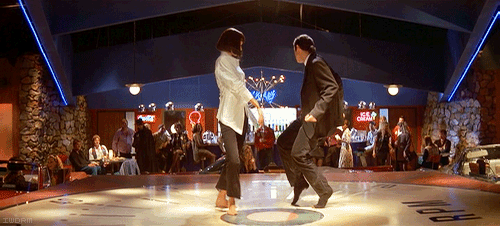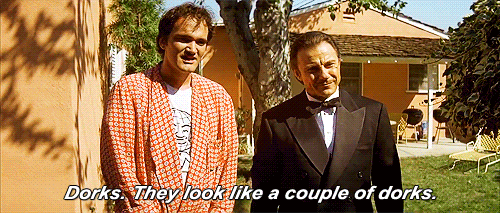I just realized that I watched the two films from 1994 back to back, which was unintentional but shows just how massively different two critically acclaimed movies from the same year can be.

Okay I guess I’ll get to the point. Every time in my life where I have heard Pulp Fiction come up in conversation, my immediate thought afterwards is always “Okay, I guess this is a movie I really need to watch.” That is because, 20 years later (yes, 1994 was 20 years ago), Pulp Fiction still has a lasting impression on pop culture. And now that I’ve seen it, I can finally understand why.

There’s no point in trying to explain the plot, so I won’t. Pulp Fiction is the product of decades of film history, all compiled by Quentin Tarantino and revealed to us in a colorful and violent display of humor and wit.

Okay very violent. But there’s an interesting quote I found on the Wikipedia page that I think is one of the best ways of explaining Pulp Fiction. Ken Dancyger says that Pulp Fiction represents “a new phenomenon, the movie whose style is created from the context of movie life rather than real life. The consequence is twofold—the presumption of deep knowledge on the part of the audience of those forms such as the gangster films or Westerns, horror films or adventure films. And that the parody or alteration of that film creates a new form, a different experience for the audience.”

Pulp Fiction is one of the most critically acclaimed postmodern films of all time. It is self-referential in that it looks and acts like a highly stylized reference to the gangster films of the past, but it still manages to make fun of those tropes in the process.

Here Tarantino plays a random man, a friend of Samuel L. Jackson’s character, and he is calling his own two main characters, Jackson and John Travolta, dorks. That’s about as self-referential as it gets.

The film also includes a random cameo from Christopher Walken, as well as a supporting role played by Bruce Willis. This storyline hardly relates to the main storyline that the film begins and ends with, and yet its characters intersect with the other world only in that Willis plays a boxer who is paid by Travolta and Jackson’s boss to lose a fight.

This seemingly random storyline told right in the middle of an almost completely unrelated tale (following Jackson and Travolta, two gangsters) is what makes Pulp Fiction so enthralling to watch. Not to mention the absurdity of Uma Thurman’s character, the wife of Travolta and Jackson’s boss.

Everything that happens is so flashy and stylized, and yet all of the characters get their own quiet moment where they reveal their view on how the world works. It’s a twisted world of gang members, petty thieves, rapists, and a crackhead wife, but they all have a perspective to offer the audience about this messed up world. And the film kind of just laughs at itself, stares at the audience, and says

Pulp Fiction is the first independent film to ever gross over $100 million. It won the Palme d'Or at the Cannes Film Festival, and also the Oscar for Best Screenplay. It ranks #4 on the IMDb Top 250, but #94 on the AFI Top 100.
No comments:
Post a Comment